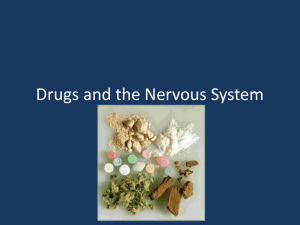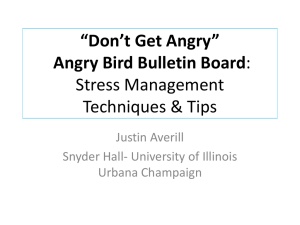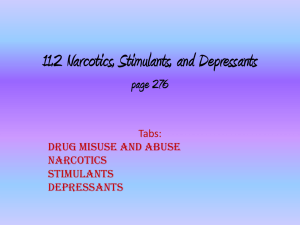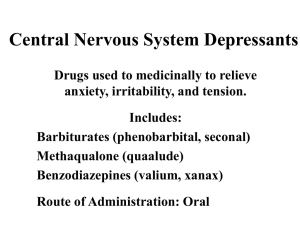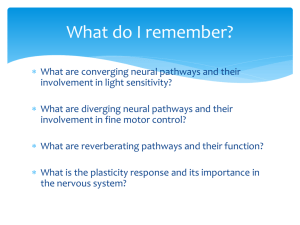How Drugs Effect the Nervous System
advertisement
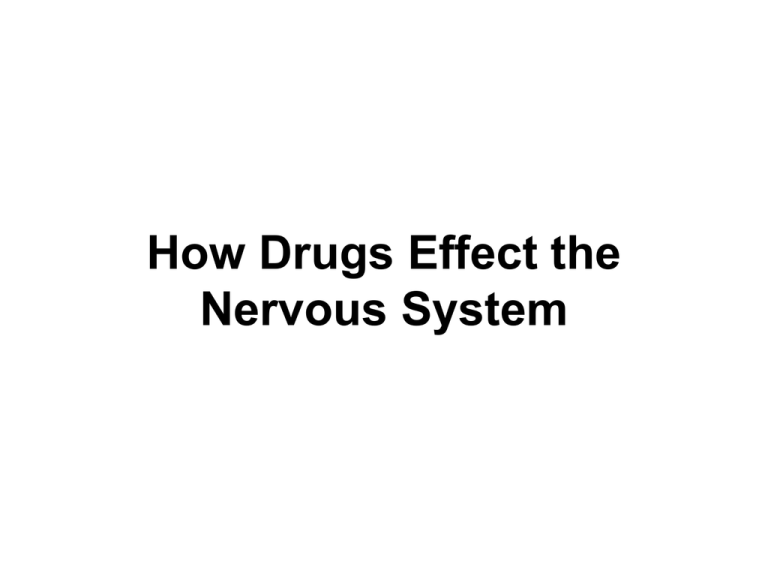
How Drugs Effect the Nervous System What is a Drug? • Drug – any substance, other than food that changes the structure or function of the body Legal Illegal Commonly Abused Drugs Section 35-5 Types of Drugs Drug Type Medical Use Examples Effects on the body Stimulants Used to increase alertness, relieve fatigue Amphetamines Increase heart and respiratory rates; elevate blood pressure; dilate pupils; decrease appetite Depressants Used to relieve anxiety, irritability, tension Barbiturates Tranquilizers Slow down the actions of the central nervous system; small amounts cause calmness and relaxation; larger amounts cause slurred speech and impaired judgement Opiates Used to relieve pain Morphine Codeine Act as a depressant; cause drowsiness, restlessness, nausea Stimulants • Increase – Heart rate – Blood pressure – Breathing – Release of neurotransmitters at some synapses in the brain • Deplete neurotransmitters and lead to: – Fatigue – Circulatory problems – Hallucinations – Depression Marijuana • Active ingredient (THC) tetrahydrocannabinol • More destructive to lungs than cigarettes – 5 marijuana cigs = 120 conventional cigs • Results in: – Lower WBC count by 40% - susceptible to infections – Teens – • inhibits maturity • Retards normal brain growth – Memory loss – Inability to concentrate – Fall short on memory as well as math and verbal skills – Males – reduced testosterone levels and increases estrogen levels – Females – • disturbs menstrual cycle • DNA damage to eggs What Else Does “Weed” Do? • • • • • • • • • • Impaired perception Loss of coordination Increased risk of accidents Impaired judgement Loss of motivation Diminished inhibitions Increased heart rate Anxiety, panic attacks, and paranoia Hallucinations Damage to the respiratory, reproductive, and immune systems • Increased risk of CANCER • Psychological dependency Opiates • Mimics endorphins • Endorphin – natural chemical in brain that helps overcome pain • When person stops taking them (withdrawl) – Brain has adjusted to high levels of endorphins – Cannot produce enough natural endorphins Cocaine • Cocaine is an opiate • Sudden release of Dopamine • Dopamine – neurotransmitter in brain that is released to give feeling of pleasure and satisfaction • Powerful Stimulant • Increases heart rate and blood pressure • First time users can have heart attack Depressants • Decrease – Heart rate – Breathing rate – Blood pressure – Relax muscles – Relieve tension • Enhances release of neurotransmitters that prevent nerves cells from firing • Alcohol with depressants can lead to death – depresses CNS to a point one stops breathing Alcohol • Depressant • Slows down CNS – 40% of 50,000 highway deaths are caused by drinking and driving – 1/3 of homocides attributed to effects of alcohol – $150 billion dollars of U.S. economy alcohol abuse treatment • Fetal Alcohol Syndrome (FAS) – Drinking while pregnant – Heart defects, malformed faces, delayed growth, poor motor development • Long-term alcohol use or bouts of excessive consumption – Destroys liver cells – Cirrhosis of liver – formation of scar tissue that prevents blood flow through liver Drug Abuse • Intentional misuse of any drug for nonmedical purposes • Addiction – uncontrollable dependence on a drug • Only Way to Prevent Addiction and Effects of Drugs………NOT taking them to begin with!
